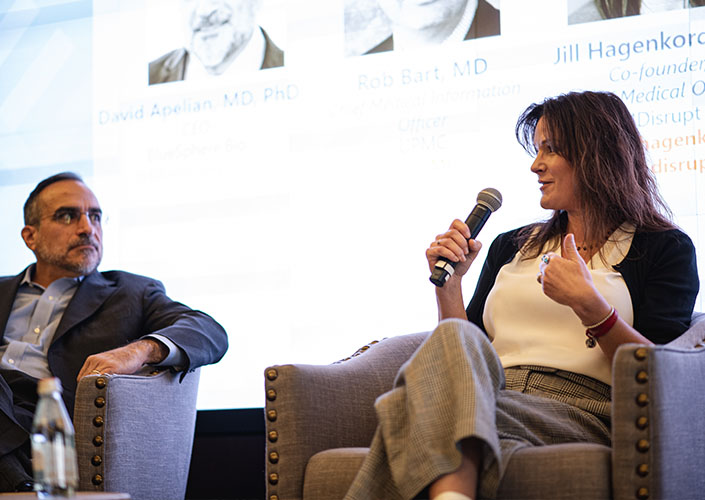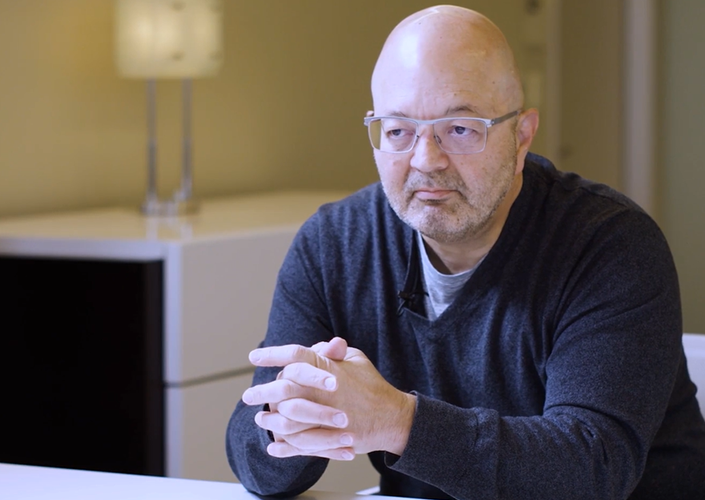Greatest potential for partnerships to improve patient engagement, says expert in consumer genomics
Health systems should be looking to partner with consumer technology companies on solutions that will boost patient engagement and ultimately lead to better health.
While tech companies can offer expertise in digital engagement, health systems must also understand that they could be accepting some risk with digital health tools, which may be unproven, and require ongoing iterations and improvements over time, according to Jill Hagenkord, MD, an expert in consumer genomics.
“There needs to be more compromise and understanding about what level of risk health systems and providers are willing to take,” said Dr. Hagenkord, who was Chief Medical Officer at MDisrupt when she was interviewed by the Center for Connected Medicine in December 2019. She has since become Vice President of Genomics at Optum.
Watch a video of her interview, in which she discusses the opportunities for partnerships between technology companies and health systems.
What is the future for partnerships between health systems and digital health companies?
Traditional health care providers should be looking to improve their digital engagement with consumers as patients seek access to health care information and services online. Tech companies can play a vital role in providing highly engaging solutions for providers.
“The best opportunity for the incumbent health systems to collaborate with the tech industry, and especially consumer tech, is partnering with them to be better able to reach out to patients where they live and where they work to keep them healthy,” Dr. Hagenkord said.
However, each party needs to clearly understand the expectations of the other side. Tech companies operating outside of the health care space typically introduce a product and then iterate in real time, Dr. Hagenkord said. Early versions can include known bugs and “performance metrics aren’t completely understood,” she said.
Health care providers first and foremost must protect human health. So they need to be sure that an app with known bugs won’t harm patients. Clear communication about what the products are, how they work, and what could go wrong is key.
“There’s so much potential with the skills the health tech industry has, especially in consumer engagement, that the health systems can really benefit from,” she said.
“The best opportunity for the incumbent health systems to collaborate with the tech industry, and especially consumer tech, is partnering with them to be better able to reach out to patients where they live and where they work to keep them healthy,” Dr. Hagenkord said.
Partnerships between providers, tech companies growing
Dr. Hagenkord, who previously held roles with consumer genomics companies, co-founded MDisrupt in 2019 with a goal of helping investors vet the claims of health-tech startups, according to CNBC.
The need for greater understanding between health systems and entrepreneurs is growing as the health care industry increasingly looks to startups and established tech companies for solutions.
Dozens of provider systems formed partnerships with major technology companies in 2019, including with Alphabet, Amazon, Apple, IBM, Facebook, and Microsoft, according to Becker’s Hospital Review.
In addition to understanding if and how a new tech solution works, health system executives should also be aware that while patients might be willing to share data with their physicians, they could be reticent to hand it over to Google, Facebook, and other tech companies.
According to a recent survey from the University of Chicago Booth School of Business and Northwestern University’s Kellogg School of Business, nine in 10 Americans would be unwilling to share their medical information with technology companies.
Rock Health and the Stanford Center for Digital Health found a similar trend in their 2019 Digital Health Consumer Adoption Report. While 73 percent of survey respondents said they were willing to share personal health data with their physicians, only 10 percent said they would share that data with technology companies.
More about Jill Hagenkord, MD
Dr. Hagenkord is a board-certified pathologist with subspecialty boards in molecular genetic pathology and a fellowship in pathology/oncology informatics. Her expertise is in health product strategy, coding, coverage, reimbursement, medical and regulatory affairs, health policy, clinical laboratory medicine, molecular diagnostics, population health, provider education, patient engagement, and medical diligence for health tech.
Dr. Hagenkord serves on a number of medical professional societies as an active member in the Association for Molecular Pathology, the College of American Pathologists, American College of Medical Genetics and Genomics, and the National Academies of Science, Engineering, and Medicine’s Roundtable on Genomics and Precision Health.
She received her medical degree from Stanford University School of Medicine, did residency training at the University of California at San Francisco and the University of Iowa, and completed fellowships at UPMC. Subsequently, she practiced pathology at Creighton University Medical Center where she founded iKaryos Diagnostics. Dr. Hagenkord previously was the Chief Medical Officer at MDisrupt, Color Genomics, 23andMe, Invitae, and Complete Genomics.
Digital health tools resources from the CCM
Watch our webinar on-demand to hear from health system and technology leaders about how providers are leveraging digital tools as in-person services expand.
Learn about how CCM partner UPMC ramped up telemedicine to address patient care during the pandemic.
And find out from a UPMC executive why health systems must prioritize the digital patient experience.



